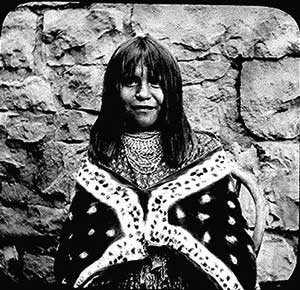Play (2014)
by Deborah Zoe Laufer
Directed by Dale J. Young
Apollinaire Theatre
Chelsea Theatre Works, Chelsea, MA
February 17 – March 12, 2017
With Becca A. Lewis (Jillian), Demetrius Fuller (Graham), Deniz Khateri (3), Arthur Waldstein (4), Paola M. Ferrer (5)

Photo: Wikipedia
Based on an actual lawsuit that stretched from the late 1980s to the early 2000s, this play focuses on the research conducted by a genetic anthropologist studying the Havasupai tribe of Arizona. The Havasupai, a small ingrown community which has lived at the bottom of the Grand Canyon from time immemorial, presented with a strong inclination towards diabetes. In the interest of pursuing an answer to the sources of the ailment, Jillian (Becca A. Lewis), a character based on the actual researcher whose case inspired the play, engages the tribe to give blood for a DNA study.
In order to have the tribe’s agreement, Jillian proffers a consent form which is very general and does not specify that the research to be undertaken be limited strictly to diabetes. Consequently, as an adjunct to her study, Jillian pursues an analysis of the tribe’s antecedent migration patterns. Violating their fundamental foundation myth that they emerged from the bottom of the Grand Canyon, the tribe enlists in a suit against Jillian and her university for failing to provide an adequate degree of information about the study when seeking their consent for it.
The story told here is quite close, apparently, to that of the actual case insofar as the researcher was from Arizona State University, pursued a genetic study of the Havasupai, and was taken to court by the tribe for conducting research on their migration patterns. The tribe argued that the consent form was not specific enough in its description of the research to be undertaken and misled the tribe about the intent of the research. The result, in addition to a cash settlement, was the return to the tribe of the blood samples taken for the research.
In a dramatic amplification of the actual events, the play accentuates the urgency that Jillian exhibits about the research because she knows that she herself possesses a gene which ensures the early onset of Alzheimer’s disease. Entangled in the drama about the Havasupai research is Jillian’s concern to conduct her study while she is able and to communicate effectively with her daughter before her dementia takes over. Moreover, knowing that her daughter is threatened genetically with the same condition amplifies Jillian’s urgency about the ability to effectively conduct genetic research in general.
This play does an interesting job of posing the insistent demands of science against the embedded contexts in which myth flourishes. It also raises relevant legal and moral questions about communication. What, in fact, constitutes the proper degree of information to be delivered to those on whom research is to be conducted? From Jillian’s point of view, the purity of the Havasupai gene pool makes it particularly desirable for genetic research of this type. And because of her intellectual and personal ambition, she does not always go the distance to make sure that the concerns voiced by the social anthropologist in her department (Arthur Waldstein) are taken seriously enough.
Engaging with members of the tribe (Deniz Khateri and Paola M. Ferrer), Jillian is at once empathetic about their victimization by diabetes and patronizing about their stiff-neckedness about their long-held myths of origination. Coming at them from a scientist’s stance, Jillian does not take the time to take seriously the potential social and psychological upset her research might impose. From her point of view, the very agreement of the tribe to have genetic research done in order to address the prevalence of diabetes suggests a willingness to allow free-form genetic research to take place, and despite warnings by her social anthropologist colleague, she pursues all dimensions of the study relentlessly.
One might raise particular legal and philosophical issues about the nature of the consent agreement, who was responsible for its wording and for ensuring that the tribe knew its implications, and argue that the play sidesteps many of these crucial points in order to put forward its essential dramatic conflict between Jillian’s scientific stance and the tribe’s mythic one. Though not a courtroom drama that entails detail of this sort, the play is suggestive of these deeper themes and effective at outlining them.
The acting, overall, is very good. Becca A. Lewis gives a taut and clear presentation as Jillian, and Demetrius Fuller is effective and heartfelt as her husband, Graham. Deniz Khateri, Arthur Waldstein and Paola M. Ferrer switch around in a variety of roles, serving as a thematically nimble chorus, and they do a fine job in their various roles.
The set by Jessica Pizzuti calling forth the Grand Canyon is simple but nicely conceived.
– BADMan
Leave a Reply